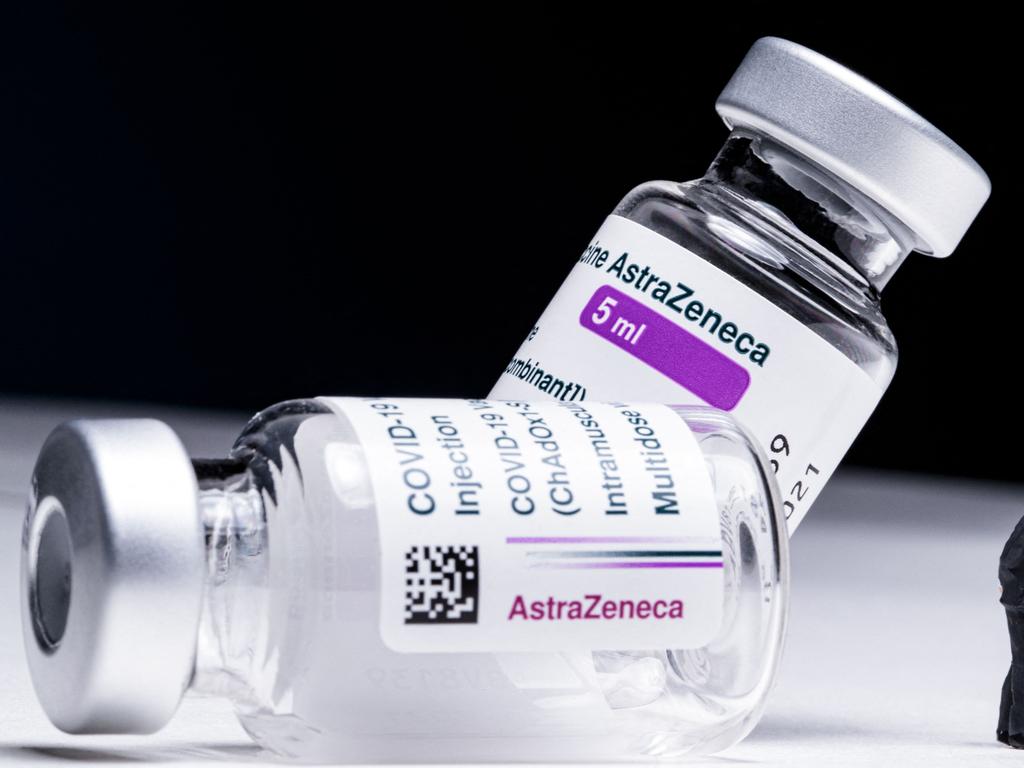AstraZeneca blood clots: Three more cases thought linked to vaccine
Health authorities are investigating three more cases of a rare blood clotting disorder thought to be linked to the AstraZeneca vaccine.
Authorities are investigating three more cases of a rare blood clotting disorder thought to be linked to the AstraZeneca vaccine.
The Therapeutic Goods Administration has reviewed suspected thrombosis with thrombocytopenia syndrome (TTS) in an 80-year-old Victorian man, a 35-year-old NSW woman and a 49-year-old Queensland man.
The 80-year-old man is the first Australian case of TTS in a vaccine recipient older than 50.
All three patients are in a stable condition and recovering.
“The VSIG [Vaccine Safety Investigation Group] concluded that all three of the cases were likely linked to vaccination,” the TGA said in a statement late on Friday.
“All three patients are clinically stable, have responded well to treatment and are recovering.”
The TGA said the patients appeared to develop symptoms between nine and 26 days after receiving the AstraZeneca vaccine.
Two of the three cases appear to be milder forms of the syndrome that were recognised “very early by the treating health professionals”, the TGA said.
In the third case, the patient developed symptoms 26 days after vaccination, which was considered “unusually late”.
One of the cases involved a blood clot in the sinuses of the brain, with the patient experiencing headaches, nosebleed, nausea and vomiting.
The other two cases involved blood clots in more common sites. One was deep vein thrombosis in the calf, which presented as leg pain, and the other was deep vein thrombosis in the upper leg.
There have now been six Australians who have developed blood clots after receiving the AstraZeneca vaccine, including five people younger than 50.
The TGA said the death of a 48-year-old NSW woman from a rare blood clot, four days after being vaccinated, was likely linked to the AstraZeneca vaccine.

About 1.1 million doses of AstraZeneca have been administered to Australians so far in the vaccine rollout.
The TGA said people who have received the vaccine should be on the lookout for symptoms including severe or persistent headache or blurred vision, shortness of breath, chest pain, leg swelling or persistent abdominal pain, and unusual skin bruising and/or pinpoint round spots beyond the site of injection.
Vaccine side-effects that are expected, and are not cause for concern unless they are severe or persistent, include fever, sore muscles, tiredness and headache. Those side-effects usually start within 24 hours of vaccination and last for one or two days.
The TGA said reports of rare clotting have generally occurred later — between four and 20 days after vaccination — and were severe, requiring hospitalisation.
The Federal Government announced major changes to the national rollout on Thursday, including restricting the Pfizer vaccine to people under the age of 50 until the end of the year.
“At this stage we will not be making Pfizer available to those 50 and over,” Health Department secretary Brendan Murphy said.
“With a few exceptions, Pfizer is now restricted to those under 50.”
The tweaked plan will also see people over 50 get the AstraZeneca vaccine sooner, and state vaccinations hubs expanded. GPs will remain the primary way Australians will be vaccinated.
Teenagers as young as 16 will now also be able to get the Pfizer vaccine as early as this year, but that’s not likely until the end of the year.
The government confirmed under 50s would not begin being vaccinated until all residential aged care patients got the vaccine first, a process that’s expected to be completed by the end of May.
“We have to finish off residential aged care. It’s nearly finished. Only a few more weeks to go and we have efficient teams going in there giving Pfizer to our aged care residents,” Prof Murphy said.
“We will soon have them completely protected and they are the single most high risk group in this country and all around the world from COVID.”




